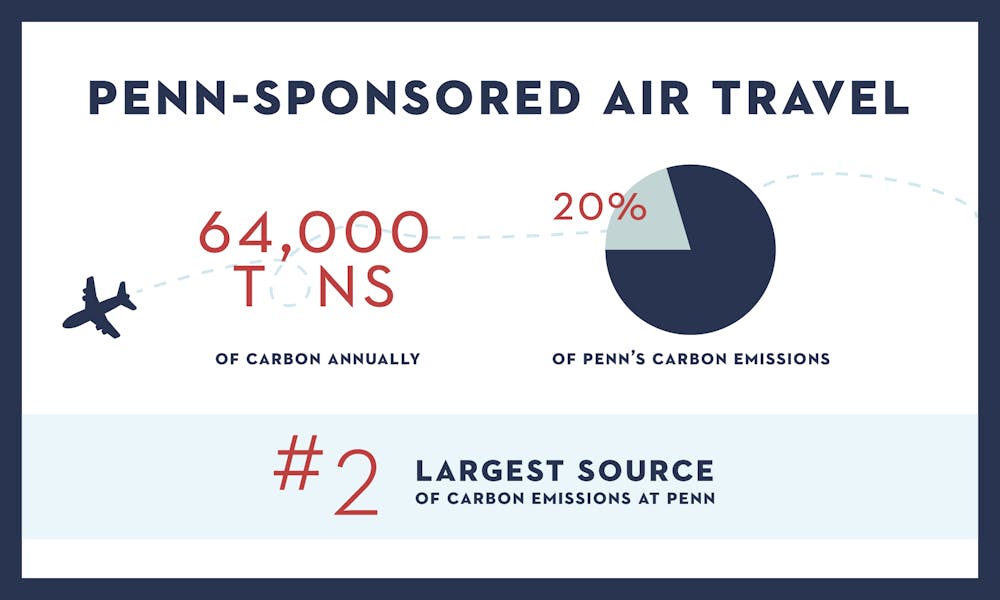In an effort to make progress toward Penn's goal of carbon neutrality by 2042, the University will purchase carbon offsets to help neutralize emissions from University-sponsored air travel.
Carbon offsets allow businesses to fund activities, such as landfill methane capture, which reduce carbon emission elsewhere, according to a report by Penn Computer and Information Science professor Benjamin C. Pierce. Businesses purchase carbon offsets to compensate for their own emissions, which can be cheaper than reducing fossil fuel use, ProPublica reported. Fossil Free Penn, however, argues that purchasing carbon offsets is an insufficient step in comparison to divesting from fossil fuels.
Director of Communications and External Relations Barbara Lea-Kruger said that, collectively, Penn subsidizes approximately 300 million miles of flight each year, primarily for business trips for faculty and staff.
Penn-sponsored air travel by students, faculty, and staff generates approximately 64,000 tons of carbon annually, accounting for 20% of Penn’s carbon emissions, according to an email sent by Penn President Amy Gutmann to Penn community members on Jan. 29. Gutmann also wrote in the email that Penn-sponsored air travel is the second-largest source of carbon emissions at Penn after energy consumption.
Chief Procurement Officer for Penn Purchasing Services Mark Mills said that purchasing carbon offsets could "neutralize" University-sponsored air travel by the end of the next fiscal year. The University anticipates that the program will launch later this year, according to the Jan. 29 email.
Penn Purchasing Services, a department within the Business Services Division, helps manage the procurement, or purchasing, of goods, services, and suppliers for the University.
Although the decision on how the offset will be paid for is not yet finalized, Mills said that a potential solution is to add a "carbon offset charge" for Penn-sponsored flights which he hopes would encourage alternate modes of travel.
College sophomore and Coordinator for Fossil Free Penn Emma Glasser said the group felt that Penn’s decision to purchase carbon offsets, although a step in the right direction, pales in comparison to the impact divesting from fossil fuels would make.
RELATED:
About 100 Fossil Free Penn members shut down Board of Trustees meeting
Penn announces new 'Environmental Innovations Initiative' for climate change research
"[Divesting] would allow Penn to be the leader it claims to be in the face of climate change — fighting against the forces which cause climate change instead of funding them," Glasser said.

Penn Purchasing Services is currently looking for carbon offset providers and locations to "offset" carbon dioxide gases and fund the reduction of fossil fuel use, Mills said.
"What we'd ultimately like to do is something as local as possible, maybe even being inclusive of the local economy," Mills said.
According to the Financial Times, however, verifying the exact amount of emissions reductions when purchasing carbon offsets can sometimes be difficult or impossible.
"We will, to a certain extent, be reliant on the governance that exists within the industry, but that's why we're being careful about who we select, to make sure that they are certified and accurately reporting on their impact," Mills said.
Gutmann also wrote in the Jan. 29 email that the University will restrict its investment program and not invest in the coal and tar sand industries. The announcement came over a year after the University Council Steering Committee rejected Fossil Free Penn’s proposal to divest from coal and tar sands.
Glasser said that although Penn has acknowledged climate change is an issue, this initiative will only offset 20% of Penn's carbon emissions while the University continues to invest in the fossil fuel industry.
"Purchasing carbon offsets for air travel is not a solution to the systemic issues causing climate change, including reliance on fossil fuels and overconsumption," Glasser said. "Purchasing carbon offsets alone perpetuates a 'business as usual' mindset that is not sustainable in the face of the climate crisis."









